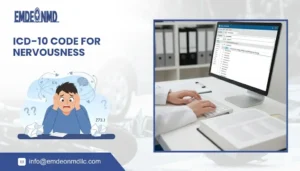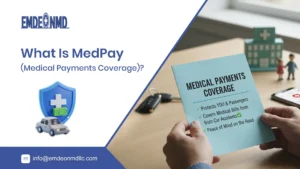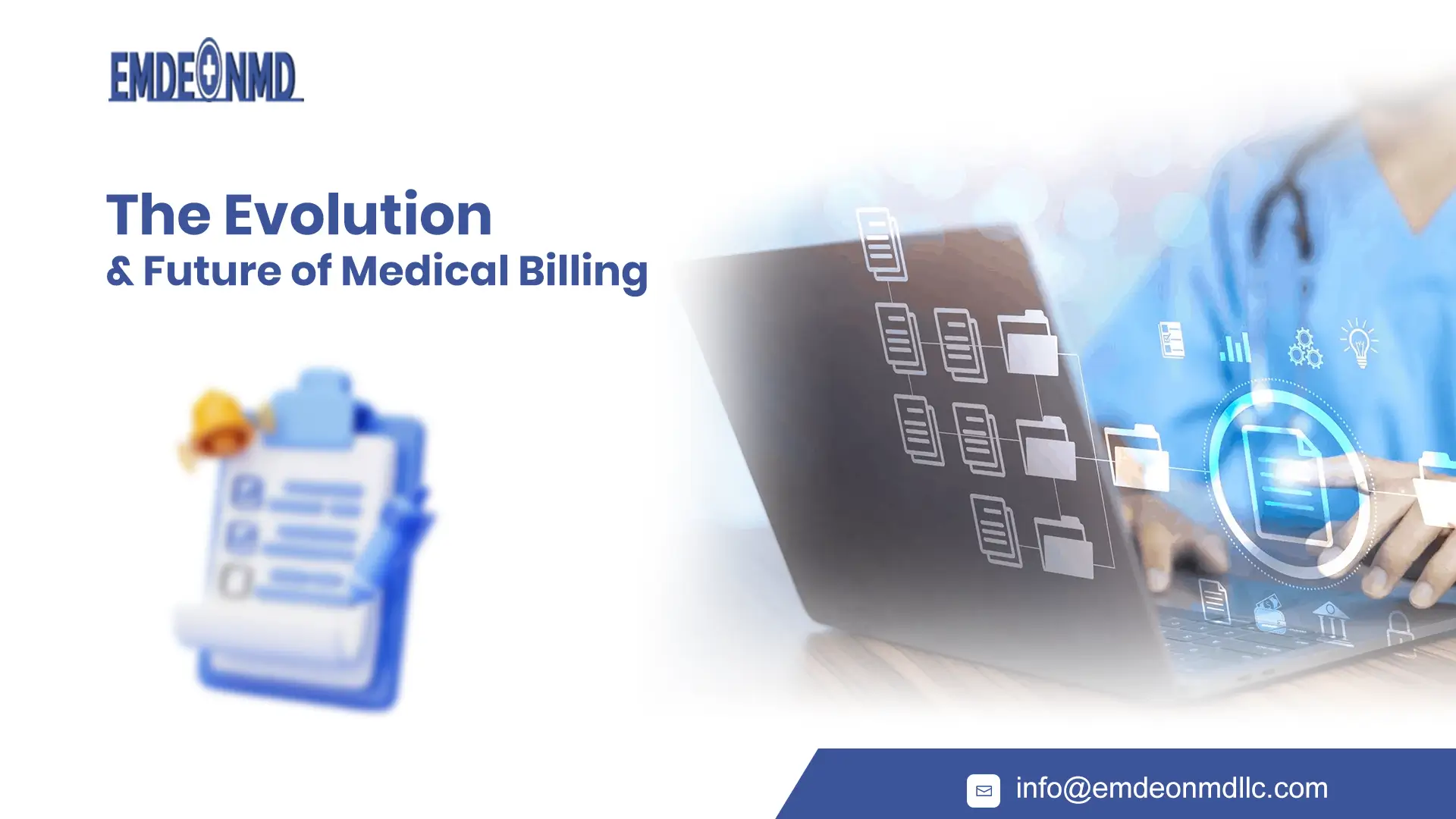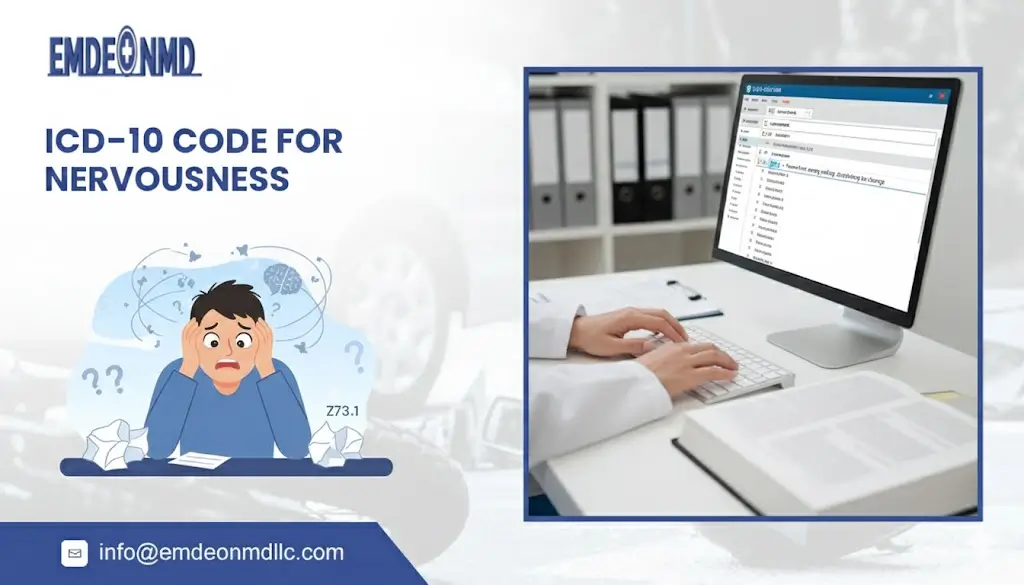Are you a medical coder or any other healthcare provider looking for detailed guidance on choosing the correct ICD-10 codes for anxiety, surfing for detailed guidelines that could help you out and prevent denials? We are here to guide you.
Anxiety is one of the emerging and highly prevalent disorders among people nowadays. In the past, it wasn’t considered a disorder that could require proper diagnosis, treatment, and counseling. Due to the emergence of its counseling and therapy sessions, anxiety medical billing is becoming common nowadays.
Billers and coders find many difficulties while choosing the correct ICD codes due to various reasons like multiple symptoms, unclear and misinterpreted healthcare provider notes, and varied anxiety disorders, making insurance claims susceptible to errors leading to denials.
ICD Codes for Varied Anxiety Disorders
Some important and highly confusing anxiety disorders commonly used in medical billing and coding related to anxiety disorders identified by different ICD-10 codes that include:
- ICD-10 unspecified anxiety ( F41.9): It is used in the case of unspecified anxiety disorder when no other code could be used.
- Generalized anxiety disorder (F41.1): Used for patients who are experiencing various challenges like social interactions, work-related anxiety, or others.
- ICD codes for panic attacks (41.0): This code is for individuals who experience recurrent, unexpected panic attacks and may require emergency support in that scenario.
- ICD-10 for social anxiety disorder F40.10:Applicable for those individuals who have a fear of social situations or performance situations due to fear of being negatively judged or humiliated.
- ICD-10 code for anxiety and panic disorder F41.0:known as a complex disorder in which an individual is suffering from dual disorders like anxiety and panic attacks simultaneously.
Here is a compilation of anxiety disorders along with their ICD-10 codes:
| CONDITION | ICD CODES |
| Anxiety unspecified | F41.9 |
| Anxiety disorder | F41.9 |
| Generalized anxiety disorder (GAD) | F41.1 |
| General anxiety | F41.9 |
| Anxiety Attack / Panic disorder | F41.0 |
| Social anxiety disorder (SAD) | F40.10 |
| Adjustment disorder with anxiety | F43.22 |
The Importance of Specificity in Coding Anxiety
Correct ICD-10 code for anxiety is highly crucial in medical billing and coding due to the listed reasons:
- Offers accurate diagnosis & treatment
- Proper & timely claims reimbursement to healthcare providers
- Regulatory compliance
- Electronic health record EHR insurance of patient
- Provision of public health data confidentiality
- Provision of coordinated quality care support
- Reducing errors & miscommunication
- Improved patient access to service
Dual Diagnosis Coding
Anxiety-related disorders are one of the most complex and challenging disorders in the field of medical billing and coding. Dual diagnoses are most coded ICD-10 codes, of which one of the most prevalent are combinatory disorders of anxiety and depression or anxiety and panic disorder. ICD-10 for anxiety and depression is used for dual disorders including anxiety and depression diagnosed simultaneously, not assumed as separate disorders to less severity. ICD-10 for a major depressive disorder known as a manic attack that has been categorized on the basis of severity :
F32.0: Mild depressive episode
F32.1: Moderate depressive episode
F32.2: Severe depressive episode without psychotic symptoms
F32.3: Severe depressive episode with psychotic symptoms
Depression and anxiety ICD-10 (F 41.8) is considered the most common dual disorder having high prevalence in the US and other states. ICD-10 code for anxiety and panic disorder is another most prevalent dual disorder being encountered due to multiple causes.
So proper considerations are required for proper knowledge about the identification of major diagnoses for accurate DX in medical coding and billing. Here isa compiled list of dual disorders with their ICD-10 codes:
| CONDITION | ICD-10 CODES |
| Depression with anxiety | F41.8 |
| Anxiety and depression | F41.8 |
| Anxiety and depression ( alternate) | F32.9 |
| Anxiety Depression | F41.8 |
| Anxiety and panic disorder | F41.0 |
| depression/anxiety | F41.8 |
The Role of Billing Companies in Ensuring Accurate Anxiety Coding
Billing companies have a significant role in offering accurate and validated billing services that is primarily dependent on proper diagnosis of major and minor complications that act as a backbone for professional billing and coding services.
Best practices for unspecified Anxiety
ICD-10 unspecified anxiety is a non-specialized code that is used when no other ICD code could be used due to incomplete provider information about the disorder or non-specific diagnosis, in order to bill the services by the insurance company.
EmdeonMD offers highly specialized billing and coding services with tailored use of ICD codes under supervised professional team having great expertise in accurate prediction of diagnosis from provider notes.
Beneficial Tips Related to Anxiety Diagnoses Billing
Billing anxiety diagnosis requires proper considerations. There are some practical tips to consider while practicing medical billing related to anxiety disorder:
- Use of accurate & specific diagnosis codes
- Documentation & record keeping
- Insurance policies compliance
- Correct procedure code usage
- Ensured medical necessity
- Avoid common coding errors
- Accordant modifiers usage
- Education & training
- Advanced technology usage
Enhancing Billing Success Through Accurate ICD-10 Coding
Billing and coding are highly reliant on correct ICD codes for the provision of verified diagnosis, acting as the primary component of any billing and RCM company. In order to promote the growth of a billing company, accurate and updated ICDs act as a crucial component to lead a successful billing and RCM company. This could be enhanced by in-depth and updated knowledge of ICD code usage, and education and training of staff could prove helpful in error reduction due to faulty ICD codes that may lead to claim denials in turn causing financial strains. Hope this could help in building concise and in-depth knowledge about ICD codes related to anxiety.
Our Approach towards ICD
So we are here to solve your problem at EmdeonMD, consistent in offering billing and coding services compliant with your needs. We are offering you a highly professional and expert view on ICDs with a prime focus on a verified and accurate understanding of provider notes that makes us unique in the market. You can freely reach us for free consultations and discussions related to billing and coding problems.
FAQs Related to Anxiety Billing and ICD-10 Coding
What happens if I use unspecified codes like F41.9 frequently?
Frequent use of unspecified codes can lead to claim denials or reduced reimbursements. It’s best to provide specific documentation to support more precise codes.
How can I handle dual diagnoses, such as anxiety and depression?
Use appropriate dual diagnosis codes like F41.8 (Anxiety and depression) or F32.9 (Depression, unspecified) when both conditions coexist. Ensure the provider notes justify the combined diagnosis.
Are there specific requirements for billing counseling or therapy sessions for anxiety?
Yes, you need to pair the correct ICD-10 diagnosis code with the appropriate CPT code (e.g., 90834 for 45-minute psychotherapy). Documentation must show the medical necessity of the session.
What should I do if a claim for anxiety treatment is denied?
Review the claim for coding errors, check payer-specific requirements, and ensure the documentation supports the diagnosis. Submit corrected claims or appeal with additional supporting evidence.












